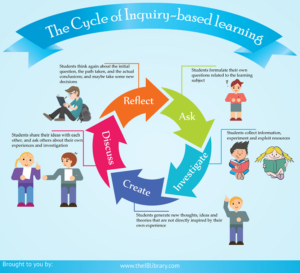Launching our cL2c COI
In our first Coffee Chat for the year, we met to launch our cL2c Community of Inquiry (cL2c COI).
What is a Community of Inquiry?
The cL2c COI is a space for teacher candidates to learn together and dive deep into issues of interest. We set forward our values to make our cL2c COI a community of care:
- You are constantly learning about new things. One important skill is to become an “adaptive expert”
→ you can adapt to your local needs and teaching situation ; you can change your practice to address your students’ learning needs
→ ultimately, you need to develop your professional judgement.
- You can do that in a community of care with other teacher candidates like you, by working on your collaborative professionalism
→ it’s important to learn how to work with others to get inspired, get emotional support, get pedagogical support, etc.
→ when you graduate this program, you will have a support network of peers who can assist you! This is your community of care!
→ Communities of care flourish when the members trust and respect each other, value each other’s opinions
- Communities of inquiry are not only about emotional support, they are also important to push your own professional learning forward
→ this model of professional learning is meant to work as a life-long learning model, not only in the B.Ed. program
→ this community-based learning model is the backbone of the whole B. Ed program, so you are likely hearing about it in all your classes. It’s also the model of learning that is promoted in the Ontario Ministry of Education, to work with students. So here, you are practicing how to do this yourselves, so that you can then lead your students in this kind of learning
→ all of this is rooted in a sociocultural model of learning, that is, learning happens through social interaction. It’s not just a matter of dispensing knowledge to students. Learners need to internalize what they are learning during the instructional process.
→ for you, this means thinking about what interests you professionally. Are you interested in:
- Learning about how to assess student speaking?
- Learning about theatre-based practices you can use in the language classroom?
- Learning about what are different learning disabilities and how this affects learners in the language classroom?
- Learning about systemic issues of racism and how they permeate in the classroom?
- How to develop digital literacies for language learners in the classroom?
- How to use technology to promote written competencies of language learners?
- How to motivate language learners in mandatory language classrooms?
- Etc.
→ It doesn’t only have to be about your learners, because ultimately, anything you do to better yourself as a teacher, will improve your students’ learning experience. Teachers are the No. 1 factor in determining how successful learners are!
What did you settle on exploring this year?
We heard from you, and these are the lines of inquiry several of you have expressed interest in developing over the year:
- Slow thinking in the language classroom
- Community building and Parental support for French Immersion families
- Online community building for P/J FLS students
Of course, if you have other ideas that emerge over the course of the year, don’t hesitate to launch a group.
Several of you also expressed interest in practicing your French conversation skills. Find resources, meet-up information and more in the cL2c COI channel on Microsoft Teams.
We’ve started a channel for all of these professional learning interests you have expressed in our cL2c COI Microsoft Team. In there, please share your progress, your notes, thoughts and musings, any resources or readings that inspire you! This is where you can gather all the learning you do around your topic and share it with others!
How do I get started?

Here are some concrete suggestions to launch you in your lines of inquiry. It’s all based on a cyclical approach that involves:
- Reflecting on some issues
- Talking to others about these issues
- Doing some research on these issues
- Sharing and explaining what you found to others – this is an important step to consolidate your learning
- Trying to apply what you learned in your practice. Maybe you were inspired to create a new activity or lesson plan. Test it out with your class in the practicum.
- Reflecting on your issue of interest again and noting what has changed about what you learned and now think. Maybe your opinion on something has changes? Or you have discovered a new concept, or new materials that you want to explore further. Reflect also on the outcomes of what you implemented: Did your lesson plan work? What needs to change or be updated?
- Reporting back to your group, again explaining your process out loud, is an essential part of consolidating your learning. It also creates accountability. When you tell others about your ideas and what you are doing, they will want to know what happened! They can also learn from you and get inspired. And vice versa!
We also covered the logistics of running and accessing the cL2c COI. Specifically we talked about Microsoft Teams and cL2c COI Instructions with Images.
Look forward to seeing and reading you on the cL2c COI!